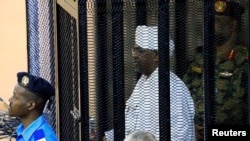Former Sudanese President Omar al-Bashir has been questioned for his role in financing international Islamist groups, according to the country’s attorney general.
“We have organizations like Hamas in our country and it has its offices,” said Abdullahi Ibrahim, a professor emeritus at the University of Missouri. Ibrahim participated in the country’s 1960s revolution and ran for president against al-Bashir in 2010. However, he added that there are some groups in Sudan who see Hamas as a legitimate political movement.
“This is the reason why I say we are getting ready to get into semantics,” he said. “I don’t want my people to get into this semantic quagmire. But if Bashir’s regime [was] money laundering through them [Hamas], that stands out as a crime and worthy of looking into.”
Sudan is still designated as a state sponsor of terrorism due to the past administration’s support of terrorist groups, including Hamas and Hezbollah. Hamas is a militant group that has sought to destroy Israel.
In December, al-Bashir was sentenced to two years in a correctional facility for corruption and money laundering charges.
Last week, Sudanese officials announced the ousted leader will be transferred to the International Criminal Court to face charges of war crimes and crimes against humanity allegedly committed in the Darfur region.
“We have a very clear-cut accusation against this man. He is wanted by the ICC,” Ibrahim said.
The move by the Supreme Council, Sudan's ruling body, which is currently controlled by the military, was hailed by international observers as an important decision. Cameron Hudson, a senior fellow at the Atlantic Council's Africa Center, told VOA’s English-to-Africa TV show “Africa 54” that the civilian government took a bold step that wouldn’t be possible without consulting with the military.
The fact that the military changed its position to make a compromise, Hudson said, “catapults Sudan from the country that was leading the international coalition against the court to serve up to the court its biggest and most important case to date in one fell swoop. It really is a complete 180 on the part of the Sudanese government. I think a shot in the arm, as they say, for international justice.”
Ibrahim agrees that the military has reversed its position on the issue. “The military was the one that was rather opposed in clear-cut terms earlier. But now I don’t know whether it is about [Head of the Supreme Council] Abdel Fattah al-Burhan’s movement to soothe,” he said. “I think they are more inclined to come to terms with the civilian leaders. Now they don’t have any qualms about this.”
Civilian or military rule?
In April, pro-democracy demonstrators toppled al-Bashir and demanded civilian rule. But Ibrahim said what happened last year was a compromise because recent diplomatic announcements, including the meeting with Israeli Prime Minister Benjamin Netanyahu, were spearheaded by al-Burhan. The meeting faced a backlash from pro-Bashir groups.
“The structure that we have now is a product of a compromise. That tug of war and it is not a compromise between revolutionaries of different persuasions. It is a situation in which the revolution gave birth to counterrevolution simultaneously,” he said. “Some people consider difficulties like taking this kind of arbitrary decision as a sign of weakness. No, it is a sign of struggle. We will be free if we come to grips with the reality that on that day in April, we had a revolution and a counterrevolution.”
'Comprehensive peace'
It is not yet clear when the 76-year-old former president will be sent to the International Criminal Court, and Hudson said that the Sudanese are “a few steps away” from seeing him at the Hague. He added that handing al-Bashir over to the ICC paves the way for the peace talks between the government and the armed movements and signals willingness to cooperate with the court.
Hudson said that it is “part of a larger peace deal that the government is trying to secure with the remaining armed movements in the country. So it's really dependent upon that kind of comprehensive peace.”
'New Sudan'
Nevertheless, the transitional government’s steps to mend international relationships, including outreach to the United States, the United Nations and Israel, are a historic break from past policies, Hudson added.
“It is a completely new Sudan. It’s a Sudan that takes justice and accountability and the rule of law seriously for the first time in more than a generation. Obviously, we want to see justice delivered for the many, victims of atrocity crimes in Darfur. More than 2 million people continue to be displaced inside and outside the country. More than 300,000 people were murdered during that conflict in Darfur.”
Still, the progress isn’t without resistance, as al-Bashir loyalists protested against handing him over to the ICC.
That, Hudson said, is “the last gasp of a fading regime.”
This story originated in the Africa division with reporting contributions from English-to-Africa’s Esther Githui-Ewart.







